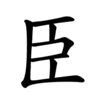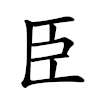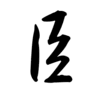臣
| ||||||||
| ||||||||
Translingual
| Stroke order (Chinese) | |||
|---|---|---|---|
 | |||
| Stroke order (Japan) | |||
|---|---|---|---|
 | |||
| Stroke order (cursive) | |||
|---|---|---|---|
 | |||
Han character
臣 (Kangxi radical 131, 臣+0, 6 strokes in Chinese, 7 strokes in Japanese, cangjie input 尸中尸中 (SLSL), four-corner 71717, composition ⿺𠃊⿳丅𠃍丅 or ⿷匚⿳丨コ丨 or ⿻巨⿱丨丨)
- Kangxi radical #131, ⾂.
Derived characters
References
- KangXi: page 999, character 13
- Dai Kanwa Jiten: character 30068
- Dae Jaweon: page 1450, character 4
- Hanyu Da Zidian (first edition): volume 4, page 2801, character 1
- Unihan data for U+81E3
Chinese
| simp. and trad. |
臣 | |
|---|---|---|
Glyph origin
| Historical forms of the character 臣 | |||
|---|---|---|---|
| Shang | Western Zhou | Warring States | Shuowen Jiezi (compiled in Han) |
| Oracle bone script | Bronze inscriptions | Chu slip and silk script | Small seal script |
 |
 |
 |
 |
Pictogram (象形) – A vertical eye of a man looking downwards. As an individual character it has taken on the meanings “slave; servant; minister”, while the meaning relating to eyes appears when used as a radical, such as in 臨 (“to look down at”) and 監 (“to inspect”).
Compare 目.
Etymology
In Old Chinese, nominalization with with nasal suffix of the verb 視 (OC *ɡljilʔ, *ɡljils, *ɢljils, “to watch”), hence literally "watcher; supervisor" (Schuessler 2007). In the archaic language of the Shang oracle bones (late second millennium BCE), this word referred to "royal officers, many of whose individual names were recorded, who served in the royal court, received the king's orders to launch military expeditions and other tasks, and received royal gifts" (Keightley 2012).
Pronunciation
Definitions
臣
- (obsolete) slave; servant; captive
- minister; statesman; official
- 己亥卜,貞。令吳小耤臣。 [Pre-Classical Chinese, trad.]
- From: Oracle bone, late second millennium BCE, quoted and translated in Working for His Majesty: Research Notes on Labor Mobilization in Late Shang China (ca. 1200–1045 B.C.) by David N. Keightley
- Jǐhài bǔ, zhēn. Lìng Wú xiǎo jí chén. [Pinyin]
- Making cracks on jihai, divined: "[We] order Wu [?] to be the Junior Servitor for Cultivation.
己亥卜,贞。令吴小耤臣。 [Pre-Classical Chinese, simp.]- 定公問:「君使臣,臣事君,如之何?」 [Classical Chinese, trad.]
- From: The Analects of Confucius, c. 475 – 221 BCE, translated based on James Legge's version
- Dìng gōng wèn: “Jūn shǐ chén, chén shì jūn, rúzhīhé?” [Pinyin]
- The duke Ding asked how a prince should employ his ministers, and how ministers should serve their prince.
定公问:“君使臣,臣事君,如之何?” [Classical Chinese, simp.]
- (more broadly) subjects of a monarch
- 溥天之下,莫非王土。率土之濱,莫非王臣。 [Pre-Classical Chinese, trad.]
- From: The Classic of Poetry, c. 11th – 7th centuries BCE, translated based on James Legge's version
- Pǔ tiān zhī xià, mòfēi wáng tǔ. Shuàitǔ zhī bīn, mòfēi wáng chén. [Pinyin]
- Under the wide heaven, all is the king's land. Within the sea-boundaries of the land, all are the king's servants.
溥天之下,莫非王土。率土之滨,莫非王臣。 [Pre-Classical Chinese, simp.]
- to make a subject
- 王若負人徒之眾,仗兵革之彊,乘毀魏之威,而欲以力臣天下之主,臣恐其有後患也。 [Classical Chinese, trad.]
- From: The Records of the Grand Historian, by Sima Qian, c. 91 BCE
- Wáng ruò fù réntú zhī zhòng, zhàng bīnggé zhī qiáng, chéng huǐ Wèi zhī wēi, ér yù yǐ lì chén tiānxià zhī zhǔ, chén kǒng qí yǒu hòuhuàn yě. [Pinyin]
- Should Your Majesty rely on the multitude of your subjects and depend on the strength of your weapons, making use of the might with which you laid waste to Wei, with a desire to subjugate the lords of the world by brute force, your servant fears that there may be trouble later on.
王若负人徒之众,仗兵革之强,乘毁魏之威,而欲以力臣天下之主,臣恐其有后患也。 [Classical Chinese, simp.]
- (humble, historical or archaic) I, me; your servant (humble pronoun, especially when speaking to a monarch)
- 王若負人徒之眾,仗兵革之彊,乘毀魏之威,而欲以力臣天下之主,臣恐其有後患也。 [Classical Chinese, trad.]
- From: The Records of the Grand Historian, by Sima Qian, c. 91 BCE
- Wáng ruò fù réntú zhī zhòng, zhàng bīnggé zhī qiáng, chéng huǐ Wèi zhī wēi, ér yù yǐ lì chén tiānxià zhī zhǔ, chén kǒng qí yǒu hòuhuàn yě. [Pinyin]
- Should Your Majesty rely on the multitude of your subjects and depend on the strength of your weapons, making use of the might with which you laid waste to Wei, with a desire to subjugate the lords of the world by brute force, your servant fears that there may be trouble later on.
王若负人徒之众,仗兵革之强,乘毁魏之威,而欲以力臣天下之主,臣恐其有后患也。 [Classical Chinese, simp.]- 自壬辰至于五六年間,賊不敢直突於兩湖者,以舟師之扼其路也。今臣戰船尙有十二,出死力拒戰,則猶可爲也。 [Korean Literary Sinitic, trad.]
- From: Admiral Yi Sun-sin, 1597, quoted in《李忠武公全書》 (Collected Works of Yi, Duke of Loyalty and Martiality), 1795
- 자 임진(으로) 지우 오륙년 간(에) 적(이) 불감직돌어양호자(는) 이주사지액기로야(니이다). 금 신 전선(이) 상유십이(하니) 출사력거전(이면) 즉 유가위야(니이다).
Ja Imjin[-euro] jiu o ryuk nyeon gan[-e], jeog[-i] bulgam jik dol eo Yangho ja[-neun], i jusa ji aek gi ro ya[-niida]. Geum sin jeonseon[-i] sang yu sibi[-hani], chul saryeok geojeon[-imyeon], jeuk yu ga wi ya[-niida]. [Sino-Korean] - Through the five or six years after 1592, the enemy have not dared directly attack Jeolla and Chungcheong because our fleet guarded their route. Your servant still has twelve battleships today. If we defend with our dying strength, it can still be done.
- a surname
Derived terms
Compounds
|
|
|
References
- “臣”, in 漢語多功能字庫 (Multi-function Chinese Character Database), 香港中文大學 (the Chinese University of Hong Kong), 2014–
Japanese
Etymology 1
| Kanji in this term |
|---|
| 臣 |
| しん Grade: 4 |
| kan’on |
From Middle Chinese 臣 (MC d͡ʑiɪn). Compare modern Mandarin 臣 (chén).
Pronoun
臣 • (shin)
Pronunciation
- IPA(key): [omi]
Proper noun
臣 • (Omi)
- (historical) the sixth-highest of the 八色の姓 (Yakusa no Kabane, “eight hereditary titles promulgated by Emperor Tenmu”) [from 675 CE]
Korean
Etymology
From Middle Chinese 臣 (MC d͡ʑiɪn). Recorded as Middle Korean 신 (sin) (Yale: sin) in Hunmong Jahoe (訓蒙字會 / 훈몽자회), 1527.